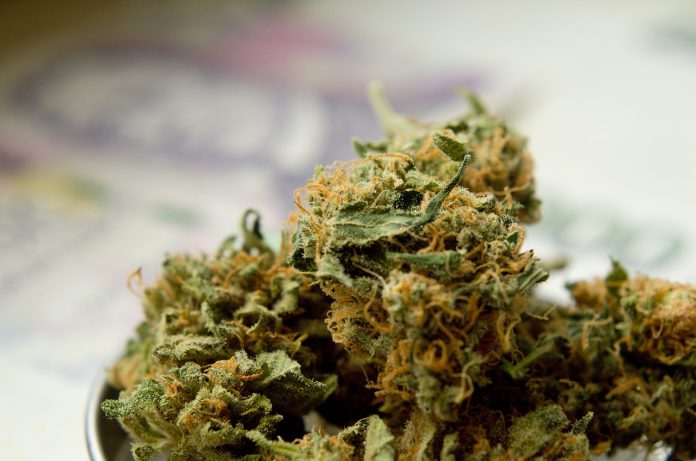MINDEMOYA—While most, if not all municipalities on Manitoulin Island have opted in to allow for cannabis retail sales and outlets to be located in their community, there are still concerns being raised by municipal representatives on issues such as enforcement and the costs involved.
Bryan Barker, a Billings Township councillor pointed out that his council recently opted in to allow for cannabis retail stores in the community, and that several local residents had responded to a survey the township put out on this issue. “I’ve done a lot of research on this issue, and for instance in the Colorado study it showed that crime increased in areas where there were retail (cannabis) outlets. I have a concern with increased calls for services, and wonder, although it may not be a fair question, if the OPP feels they will see an increase in calls for service?”
Manitoulin OPP Acting Inspector Megan Cavanagh told the meeting, “it is difficult at this point to determine this. Each municipality is unique,” she said, noting there is a lot of information online concerning Colorado having made cannabis legal. “As for the second part on enforcement, even before the legislation came down making cannabis legal we (OPP) trained more officers to identify drug use in persons.”
“I understand the only way municipalities will be able to control cannabis not being smoked, for instance on beaches, is that it has to be covered by a municipal bylaw,” said Mr. Barker. “What I would like to ask is if the OPP will enforce these (municipal) bylaws?”
“This is a really good question,” said Inspector Cavanagh. She said the police will enforce bylaws passed by a municipality, but not in terms of use in buildings.
“Will there be guidance provided by the OPP to councils on writing these bylaws?” asked Mr. Barker.
The inspector noted that municipal councils can refer to the Ministry of Community Safety and Correctional Service webpage for this information. Inspector Cavanagh said local OPP staff will be tracking the number of enforcement infractions relating to cannabis use. “As this moves forward these statistics will be made available.”
Al Boyd, a Northeastern Manitoulin and the Islands (NEMI) councillor and new chair of CPAC, told the meeting, “Our decision was to opt in, and provide the opportunity for (entrepreneurs) to open a retail outlet, but municipalities have not been provided a lot of materials before we were to make a decision. Then after the decision was made to opt in, the province announced only 25 licences would be granted at this time for cannabis retail stores, and requirements involving a certain population base for a community to be eligible for this.”
Mr. Boyd noted that NEMI council also raised concerns with increased crime, and pointed out that municipalities are to be provided $10,000 towards offsetting the costs involved. He told the meeting, “there are probably a half dozen dispensaries in the (NEMI) community currently, and we hear of cases where neighbours calling the OPP about someone being in theirs or neighbours driveways at all times of the day and night and illegal distribution of drugs. Having a regulated retail outlet in the municipality might hopefully put some of these dispensaries out of business.”
“Assiginack council opted in,” said Dave McDowell. “I’m hoping that if nothing else having legal retail cannabis outlets will benefit seniors in the community, as it would help get rid of the stigma about using cannabis for ailments; they didn’t want to use the product because it is illegal. If it helps they should use it.”
Gordon-Barrie Island council also opted in, said Councillor John Turner. “We didn’t want to close the door on retail business being created in the future. Ontario’s moving forward with beer and wine in grocery and corner stores, and we didn’t want to close the door on cannabis products being sold through retail outlets.”
“It (cannabis) is now legal anyway,” said Patricia Bailey, a Gore Bay town councillor. “So why shut the door and back away from the funding that is going to be provided by the government for this. It is now legal and because of medical purposes it may be able to help people (with medical ailments).”
Steve Shaffer, a Central Manitoulin councillo,r noted his council opted in as well. “Like everyone else we had a hard discussion on this whole issue. This will allow for legal licenced retail outlets being similar to beer and liqour stores and there will be public input in that process (in locations for retail outlets).”
Mr. McDowell noted it will cost $56,000 for persons to apply for potential cannabis retail outlets.
Wayne Bailey, a Burpee-Mills councillor pointed out that a national report released earlier in the week showed that the cost of obtaining illegal cannabis is 45 percent less in cost than legal cannabis, which is a concern that it might actually mean an increase in black market sales.
“I agree 100 percent,” said Mr. Barker. “It could increase the black market. Communities need to be aware of this. It’s going to be an interesting road to see what the impacts of legalizing cannabis will mean.”





